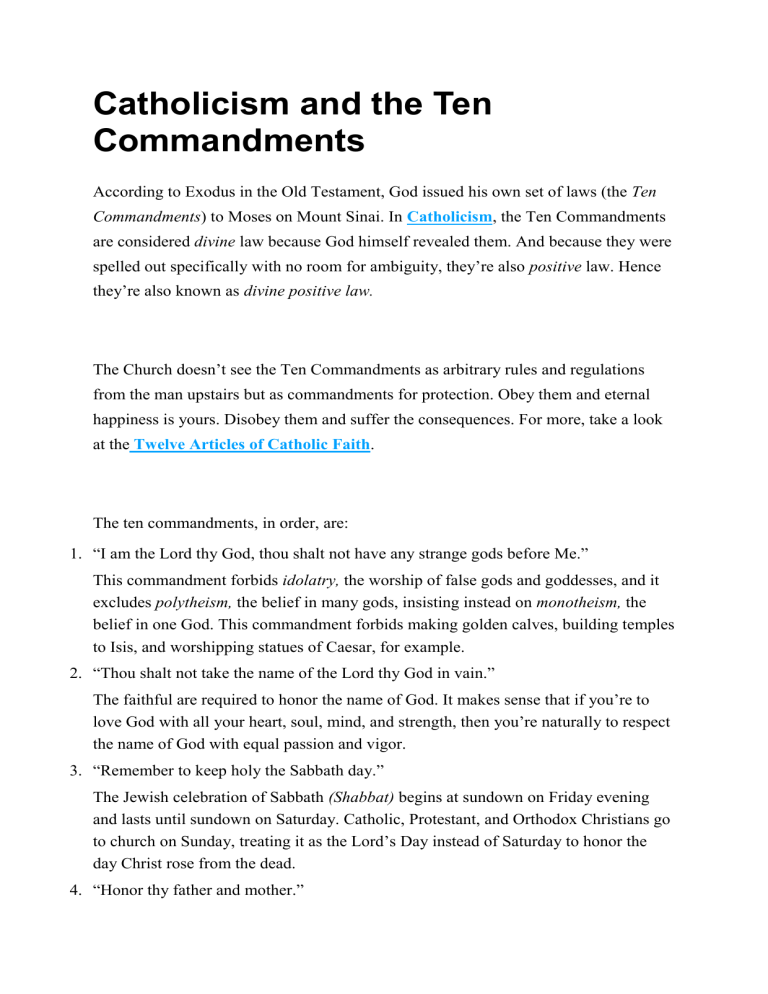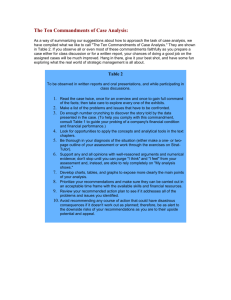
Catholicism and the Ten Commandments According to Exodus in the Old Testament, God issued his own set of laws (the Ten Commandments) to Moses on Mount Sinai. In Catholicism, the Ten Commandments are considered divine law because God himself revealed them. And because they were spelled out specifically with no room for ambiguity, they’re also positive law. Hence they’re also known as divine positive law. The Church doesn’t see the Ten Commandments as arbitrary rules and regulations from the man upstairs but as commandments for protection. Obey them and eternal happiness is yours. Disobey them and suffer the consequences. For more, take a look at the Twelve Articles of Catholic Faith. The ten commandments, in order, are: 1. “I am the Lord thy God, thou shalt not have any strange gods before Me.” This commandment forbids idolatry, the worship of false gods and goddesses, and it excludes polytheism, the belief in many gods, insisting instead on monotheism, the belief in one God. This commandment forbids making golden calves, building temples to Isis, and worshipping statues of Caesar, for example. 2. “Thou shalt not take the name of the Lord thy God in vain.” The faithful are required to honor the name of God. It makes sense that if you’re to love God with all your heart, soul, mind, and strength, then you’re naturally to respect the name of God with equal passion and vigor. 3. “Remember to keep holy the Sabbath day.” The Jewish celebration of Sabbath (Shabbat) begins at sundown on Friday evening and lasts until sundown on Saturday. Catholic, Protestant, and Orthodox Christians go to church on Sunday, treating it as the Lord’s Day instead of Saturday to honor the day Christ rose from the dead. 4. “Honor thy father and mother.” This commandment obliges the faithful to show respect for their parents — as children and adults. Children must obey their parents, and adults must respect and see to the care of their parents, when they become old and infirm. 5. “Thou shalt not kill.” The better translation from the Hebrew would be “Thou shalt not murder” — a subtle distinction but an important one to the Church. Killing an innocent person is considered murder. Killing an unjust aggressor to preserve your own life is still killing, but it isn’t considered murder or immoral. 6. “Thou shalt not commit adultery.” The sixth and ninth commandments honor human sexuality. This commandment forbids the actual, physical act of having immoral sexual activity, specifically adultery, which is sex with someone else’s spouse or a spouse cheating on their partner. This commandment also includes fornication, which is sex between unmarried people, prostitution, pornography, homosexual activity, masturbation, group sex, rape, incest, pedophilia, bestiality, and necrophilia. 7. “Thou shalt not steal.” The seventh and tenth commandments focus on respecting and honoring the possessions of others. This commandment forbids the act of taking someone else’s property. The Catholic Church believes that this commandment also denounces cheating people of their money or property, depriving workers of their just wage, or not giving employers a full day’s work for a full day’s pay. Embezzlement, fraud, tax evasion, and vandalism are all considered extensions of violations of the Seventh Commandment. 8. “Thou shalt not bear false witness against thy neighbor.” The Eighth Commandment condemns lying. Because God is regarded as the author of all truth, the Church believes that humans are obligated to honor the truth. The most obvious way to fulfill this commandment is not to lie — intentionally deceive another by speaking a falsehood. So a good Catholic is who you want to buy a used car from. 9. “Thou shalt not covet thy neighbor’s wife.” The Ninth Commandment forbids the intentional desire and longing for immoral sexuality. To sin in the heart, Jesus says, is to lust after a woman or a man in your heart with the desire and will to have immoral sex with them. Just as human life is a gift from God and needs to be respected, defended, and protected, so, too, is human sexuality. Catholicism regards human sexuality as a divine gift, so it’s considered sacred in the proper context — marriage. 10. “Thou shalt not covet thy neighbor’s goods.” The Tenth Commandment forbids the wanting to or taking someone else’s property. Along with the Seventh Commandment, this commandment condemns theft and the feelings of envy, greed, and jealousy in reaction to what other people have. In addition to the Commandments, Catholics also recognize these common prayers.








